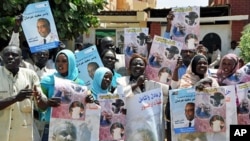Confusion reigns in north and south Sudan following a series of mixed declarations about boycotting an election just one week away. Opposition parties claim the April vote is already rigged in favor of the Sudanese president and his ruling party, but the national elections commission says the vote will take place as scheduled.
For a few hours Thursday, it appeared Sudan's opposition parties had united in a monumental full boycott of elections they say will be a sham. All but one of the main parties' presidential challengers had apparently pulled out, and elections at all levels were to be snubbed in protest.
This superficial unity has since dissolved. The country's two main Sufi sect-based northern opposition parties have backtracked on the announcement, and a full boycott from the divided opposition forces looks increasingly unlikely.
To stave off a boycott that could deprive the ruling party of the democratic legitimacy it hopes to receive from the vote, the northern opposition has demanded that President Omar Hassan al-Bashir postpone the elections. But Mr. Bashir has consistently rejected this demand, and did so once again on Saturday during a campaign speech in eastern Sudan.
Any chance of a substantial election delay became even slimmer Saturday when U.S. special envoy to Sudan Scott Gration appeared to back the national elections commission as it announced that polls would proceed on time, despite allegations of significant electoral irregularities.
Mr. Gration said that the election officials had "stepped up and met the challenge."
"These people have gone to great lengths to ensure that the people of Sudan will have access to polling places, and that the procedures and processes will ensure transparency and will ensure that the people's vote get registered and counted in the best way possible," Gration asserted.
Wednesday, South Sudan's ruling former rebels Sudan People's Liberation Movement announced it was withdrawing its presidential candidate, northern secular Muslim Yasir Arman, who was seen as Mr. Bashir's leading challenger in the upcoming polls. The party also announced it would not contest in the Darfur elections, saying a fair vote could not be held there during the ongoing instability.
The unexpected move threw Sudan's northern opposition into disarray. The country is to hold its first multi-party elections in 24 years next week, and the South's main party was the leader of a loose alliance of opposition forces against Sudan's ruling National Congress Party, against whom southerners had waged a long and bloody war.
Some northern opposition party leaders, angered by the unilateral pronouncement of a partial boycott, have accused the southern party of caving in to the wishes of the NCP in an attempt to secure a Southern secession vote agreed to in a 2005 peace deal.
While a coordinated full boycott was viewed as a potentially strong rebuke to the credibility of the upcoming elections, the go-it-alone decision to only pull out of the presidential and Darfur votes has been denounced by critics as playing into the hands of Mr. Bashir, especially now that the northern opposition's own attempt to declare a full boycott has seemingly failed.
Former Bashir ally and now Islamist opposition leader, Hassan al-Turabi, said the Sudanese leader was likely pleased to hear the news of SPLM's withdrawal.
"Of course, the withdrawal of the presidential candidate is a pleasure for the president because he thinks he might secure some votes in the South. He might think he is better off now," al-Turabi said.
SPLM officials have denied any special deal was made behind closed doors, saying the decision to withdraw their candidate was due to clear vote rigging on the part of its Khartoum peace partners.
While those in the north have been left confused and exhausted trying to follow the back-and-forth movements of Bashir's disjointed opposition, South Sudanese have been offering mixed reactions to the course chosen by its ruling party. The decision seemed to only further disorient some who already have difficulty grasping next week's highly complex polls, in which each Southerner must cast 12 ballots in four different boxes.
A Juba resident, who asked to be identified only by his first name Mordi, says he does not know whom he should pick for president now that SPLM's Arman has pulled out.
"I do not know actually why he resigned. I do not feel all right. Let him stay in his place because we want to vote for him," said the Juba resident.
But South Sudanese Samuel Amyuat says that his party made the right decision, as participating in the presidential vote would only add credibility to what is expected to be an unfair election.
"It was a good decision because elections are about democracy," he said. "It is for I to choose my president, but it is not for my president to choose himself alone. Of course, if he can choose himself and if he passes, we can announce that he has passed in a democratic election, which is not fair. That is what we do not want," said Amyuat.
The International Crisis Group says Mr. Bashir's NCP has already rigged the vote, saying the party has "manipulated the census results and voter registration, drafted election laws and drawn electoral districts in its favor, co-opted traditional leaders, and bought tribal loyalties."
Mr. Bashir became the first sitting head of state to be indicted by the International Criminal Court last year on war-crimes charges relating to the conflict in Darfur, where the United Nations says more than 300,000 people have died since 2003.
The North-South Sudan war killed an estimated two-million people since 1983. South Sudan's referendum for political separation is scheduled for January next year.
Confusion, Division Plague Sudan's Opposition Ahead of Polls




